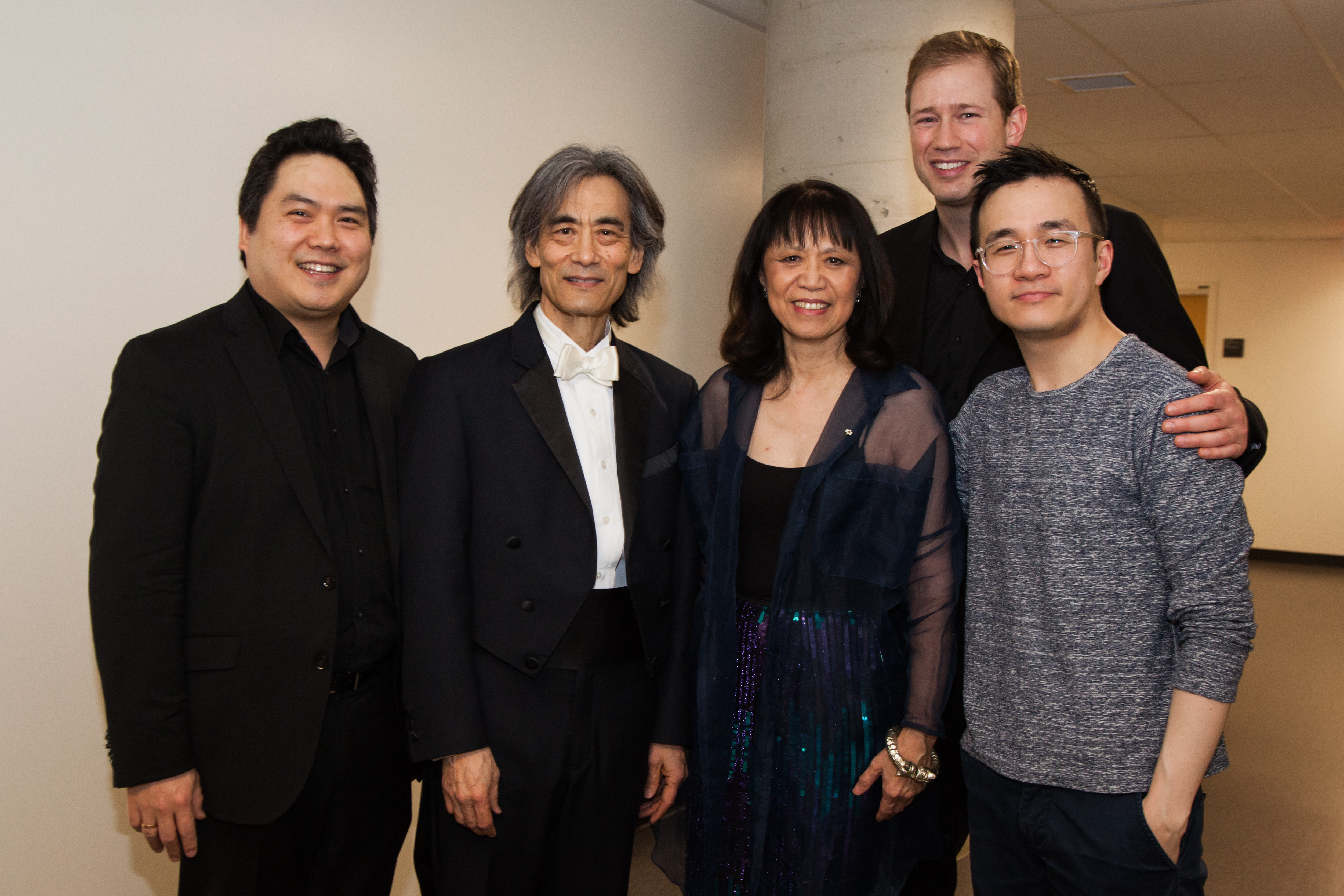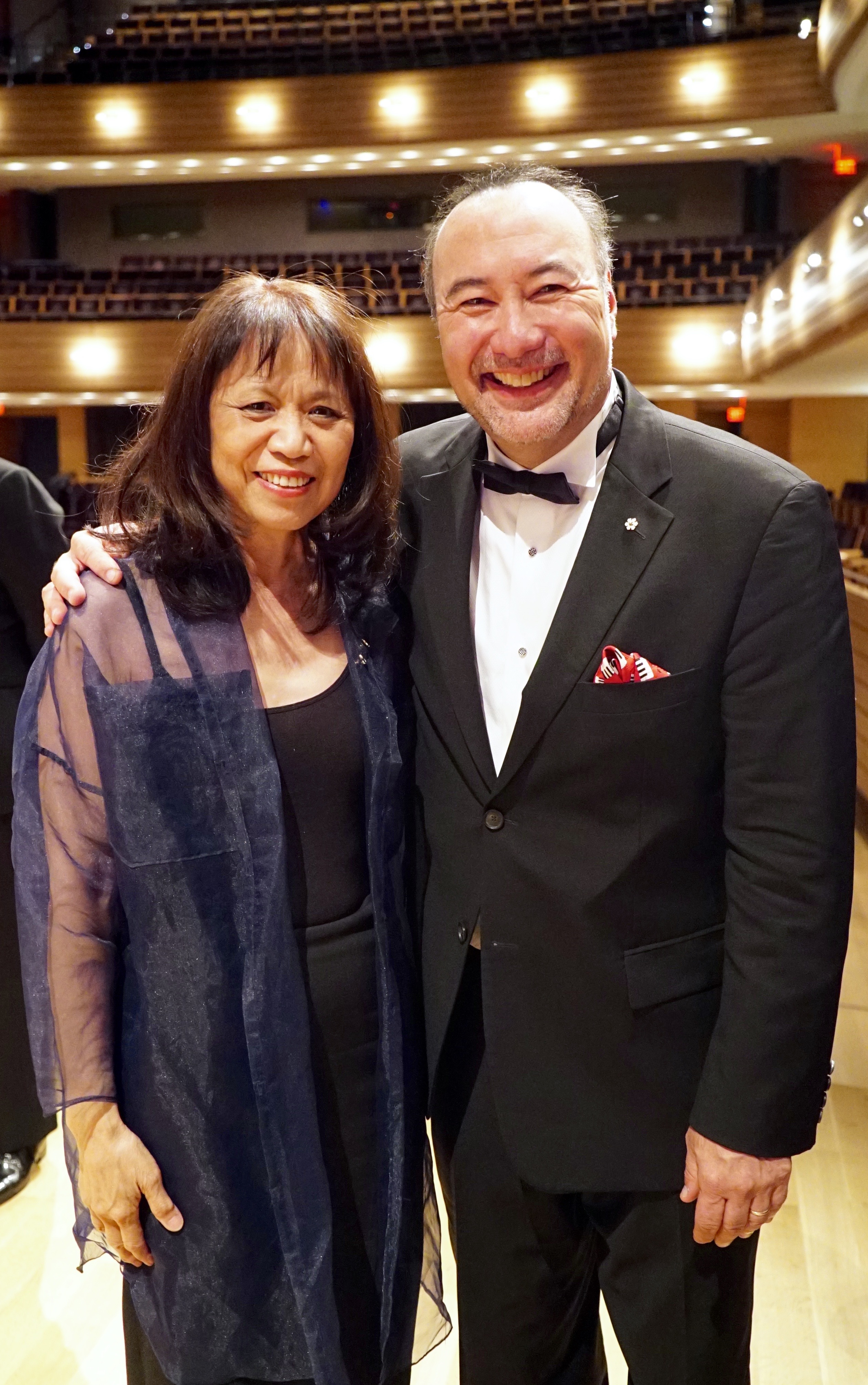Full Bio
Alexina Louie, one of Canadaʼs most highly regarded and most performed composers, developed her unique musical voice through explorations of Asian art and philosophy. Louieʼs communicative, highly dramatic work pushes the boundaries of convention and tradition. Performed and broadcast internationally, her commissioned works range across all musical genres, including ballet and opera.
An Officer of the Order of Canada (Canada’s highest civilian honour) and a recipient of the Order of Ontario, Louie received an honorary doctorate from the University of Calgary in 2002. She has received many prizes including multiple JUNO Awards (Best Classical Composition), the National Arts Centre Composers Award, and the Jules Léger Prize for Chamber Music.
Each of her pieces is specifically tailored to the musician, ensemble, or orchestra who commissioned the work, hence the eclectic stylistic variety of her work.
From such interesting and challenging commission requests as Take The Dog Sled (2009) for two Inuit throat singers and seven instrumentalists (Montreal Symphony Orchestra) to her recent Triple Violin Concerto for Three Violins and Orchestra (2018, Toronto Symphony Orchestra, National Arts Centre Orchestra, Montreal Symphony Orchestra) the expansiveness of her imagination and skill are apparent.
Of note are her works for chamber ensemble including the dazzling Beyond Time (2014) for violin and piano which was commissioned by violinist, James Ehnes, and Echoes of Time (2011) commissioned by The Gryphon Trio. This composition, commissioned as a prelude for performances of Messiaen's Quartet For The End of Time. Her work opens with dark utterances in the cello and the lower strings of the piano which are meant to convey the desolation of the prisoner of war camp in which Messiaen composed his masterpiece. Recognizable musical gestures from Messiaen’s work are used as jumping off points for Louie’s own musical language, harmonies and structure.
Not to be overlooked in a discussion of her work are her operas. The Scarlet Princess (1996 - 2002) with libretto by the Tony award-winning playwright, David Henry Hwang, is based on a 17th Century Kabuki play. Its wide-ranging emotional and musical palette reveals the story of forbidden love, betrayal, demonic possession, incarnation, murder and forgiveness.
On the opposite side of her operatic creations are her ground-breaking five minute comedic made-for-TV operas Toothpaste and the operatic collection, Burnt Toast. Based on the humourous operatic potential found in everyday relationships (librettist Dan Redican, director Larry Weinstein), these mini-operas have found an underground fan base and have garnered international attention. Toothpaste, which introduced soprano Barbara Hannigan to a wider international audience, has even been showcased in the Louvre as a finalist in the coveted international arts film competition “Classique en images” (2002) along with feature length films about Karlheinz Stockhausen and Igor Stravinsky.
In 2006, her filmed opera Burnt Toast, created with the same collaborative team, was awarded the prestigious International Golden Prague Grand Prix (147 films from 28 countries).
Louie’s music has been admired for its originality, expressivity and compositional craft. Even through the breadth of styles her unique voice is recognizable. After performances of her music audiences are often deeply moved by what they have experienced. Her musical language is ‘new’ and ‘exploratory’ and yet it retains a strong connection to musical evolution.
For Louie music is deeply personal act of self-expression and communication.

Above: Following the Montreal Symphony premiere of Alexina Louie's Triple Concerto for Three Violins and Orchestra. Yosuke Kawasaki, Kent Nagano, Alexina Louie, Jonathan Crow, Andrew Wan at Montreal's Maison Symphonique in 2018.

Above: Alexina Louie and Jon Kimura Parker following Parker's performance of Louie's
Memories In An Ancient Garden at Koerner Hall in 2016.
Background
Louie was born in Vancouver, Canada where she graduated from the University of British Columbia.
Living in California for a decade during the turbulent 1970s, she credits these years as having a profound influence on her life. After graduating with a Master of Arts in Composition from the University of California at San Diego where she studied with the celebrated American composer Pauline Oliveros.
During her UCSD years, she became an inaugural member of Oliveros’ Women’s Ensemble, an incubator for Oliveros’ lifelong project, her highly influential Sonic Meditations. One of the meditation exercises that Louie brought to the group eventually became an integral part of Oliveros’ Sonic Meditation events, which Pauline continued to lead throughout her life. Unknown to Louie until a few months before Oliveros’ death, Pauline had been for decades closing her presentations with this meditation and even named the meditation after her calling it “Zina’s Circle”.
After graduating from UCSD, Louie settled in Los Angeles where she taught piano, theory, and composition. During these years she researched Asian music and cultures. She began developing her own unique musical voice based on these influences. During this period she wrote compositions that incorporated prepared piano.
Louie lived in California for ten years after which she moved back to Canada, finally settling in Toronto. Her unique compositional style was almost immediately recognized in the Toronto musical scene and she was commissioned by the city’s pre-eminent performers and ensembles. National and international broadcasts followed and she quickly established herself as one of the leading composers in Canada.
In 1986 conductor Sir Andrew Davis commissioned The Eternal Earth and subsequently took Louie and her piece on the Toronto Symphony Orchestra’s European tour where her work was prominently featured.
In 1990 conductor Gunther Herbig commissioned Music For Heaven And Earth for the Toronto Symphony’s Far East Tour which included several cities in Australia, Singapore, Taiwan, and Japan.
One of her most important works was written immediately upon hearing of the death of Glenn Gould in 1982, a Canadian musical icon known around the world. Commissioned by the McGill University student string orchestra for its Contemporary Music Festival II, it was premiered by the student orchestra in 1983. The work, O Magnum Mysterium: In Memoriam Glenn Gould is scored for forty-four divisi strings. It is a powerful and moving outpouring of her response to Gould’s premature death. In the year following its premiere, the piece was performed in the same season by the Toronto Symphony, the Montreal Symphony, and the Vancouver Symphony. In 2003, The National Ballet premiered one hundred words for snow, Dominique Dumais‘ brilliant comment on Gould’s artistic inspiration set to Louie’s homage to Gould which continues to be one of her most significant works.
Performances & Broadcasts
Her compositions have had many important official performances including the 1986 performance of The Ringing Earth, a festive overture commissioned for the gala opening of Expo ‘86 by The Vancouver Symphony Orchestra (Mario Bernardi). At this event she was presented to their Royal Highnesses, Prince Charles and Princess Diana, who officially opened the Exposition. In 1989 The Ringing Earth was featured on a United Nations Day Concert which took place in New York inside the United Nations General Assembly by the Montreal Symphony Orchestra (Charles Dutoit).
Her music has even been taken to outer space, as Star-filled Night was chosen to accompany Canadian astronaut Steve MacLean aboard the space shuttle in 1992.
Her works have been performed and broadcast internationally in Beijing, Shanghai, Taipei, Belgrade, Tokyo, Zagreb, Vienna, London, Paris, Brussels, Singapore, Helsinki, Stockholm, Dresden, Amsterdam, New York, Los Angeles, Washington DC, Sydney, Melbourne and Adelaide, Australia, as well as many other major international centres.
In 2018 Louie’s orchestral performances included performances of two different works within one month of each other (Triple Concerto For Three Violins And Orchestra and Take The Dog Sled) by the Montreal Symphony, a rare event.
Academic Studies on the Work of Alexina Louie
Doctoral Thesis Subject
Kim, Yoomi. University of Cincinnati. The Evolution of
Alexina Louie’s Piano Music: Reflections of a Soul Searching
Journey. 2009.
Hahn,ChristopherCharles. University of Oklahoma. Canadian pedagogical piano repertoire since 1970: A survey of contemporary compositional styles and techniques. 2005.
Kruja, Mira. University of Kentucky. Piano Inside Out: the Expansion of the Expressive, Technical, and Sonorous Spectrum in Selected Twentieth-Century
Art-Music Repertoire for the Modern Acoustic Piano. 2004.
Chu, Esther Yu-Hui. University of Alberta. On the Musical Silk Route: Piano Music of Alexina Louie. 1997.
Neumann, Mark. Julliard School of Music, New York Five Canadian Viola Concertos of the 1980’s: an analytical study and performance guide. 1995.
Ryan, Jeffrey. The Cleveland Institute of Music and Case Western University. Pitch Organization in Alexina Louie’s Winter Music: The Yin/Yang
Principal in Structure and Design. 1995.
Turgeon, Edward. Yale School of Music. Three Recent Works of Alexina Louie: Valuable New Components of the Cello, Piano and Chamber Music Literature. 1994.
Parker, Jon Kimura. Julliard School of Music, New York. The Solo Piano Music of Alexina Louie: A Blend of East and West. 1989.
Masters Thesis Subject
Begay, Diane. University of Ottawa. Contemporary Music in Canada: Alexina Louie. 1994.